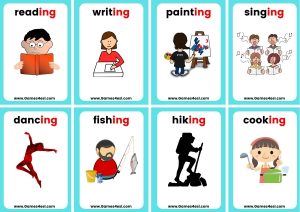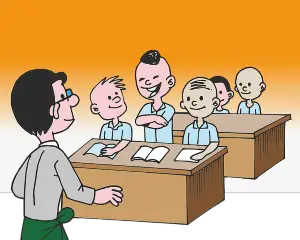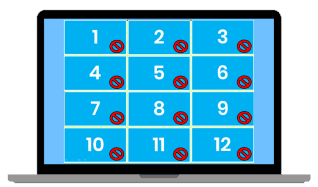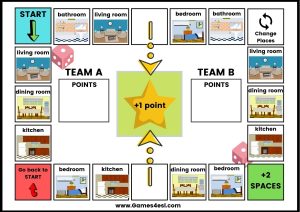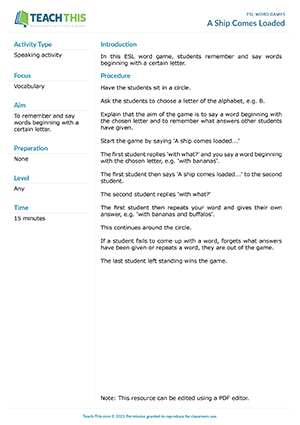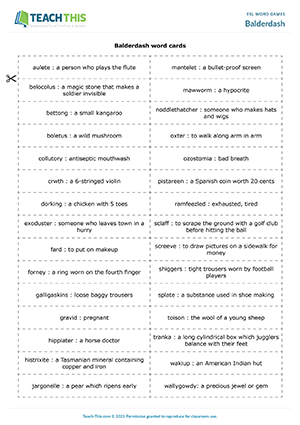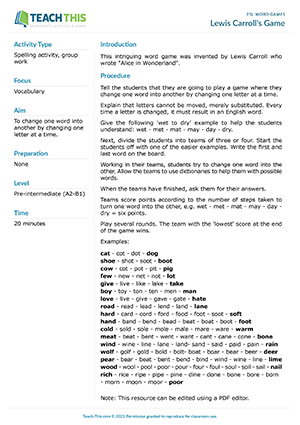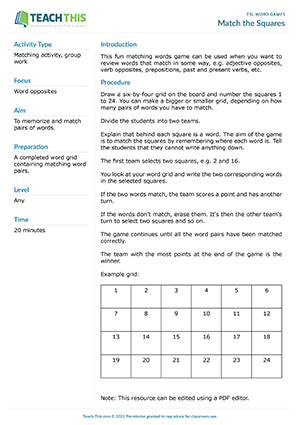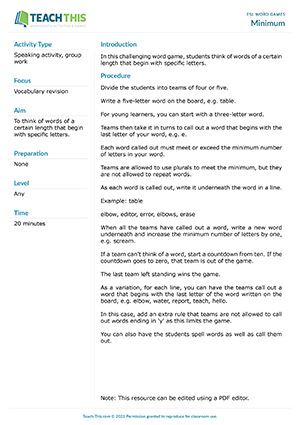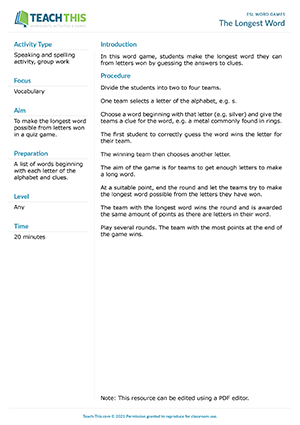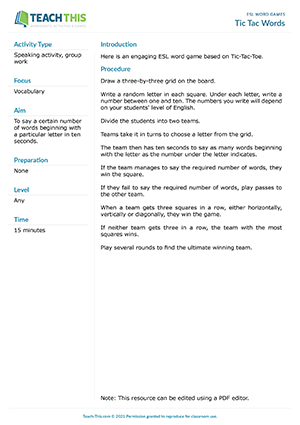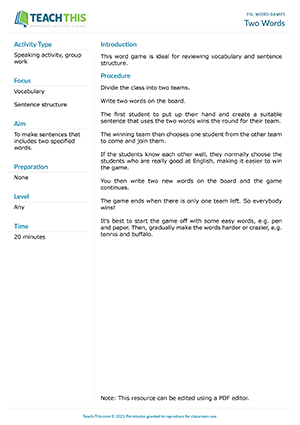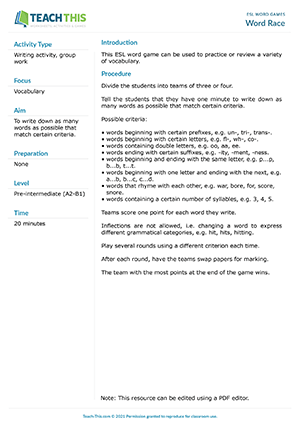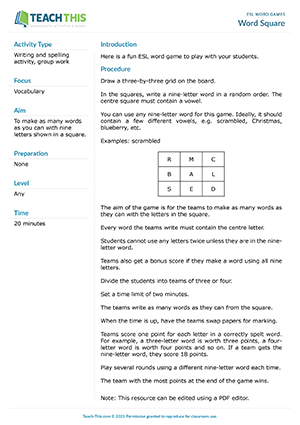The acquisition of new vocabulary is essential in terms of overall language advancement. However, there is always a need to review active words from time to time in order to use them fluently in speech. Here, we will present a couple of great vocabulary revision games which will perk up every classroom. Through these games the learners will feel how fun, entertaining and effective the learning process can be.
1. Charades
Charades is a fun and cool revision game. Students need to practice their acting skills to explain the words. This game is extremely easy to organize with minimal advance preparation. The only thing to be ready for is to keep a collection of vocabulary cards for the words you have studied.
The class is divided into two teams. Each team member takes turns acting out one of the words from the vocabulary set and explains it by acting out the word. If his or her own team can’t guess the word, the opposite team gets the chance to guess it. Each right answer equals one point.
Skyeng ищет преподавателей английского. Подробности по ссылке: Skyeng
2. Pictionary
Pictionary is also an entertaining game to play for vocabulary review. The rules are similar to those of charades except that instead of acting out the word, it is drawn on the board.
3. Bingo
Bingo can serve as a good revision game. From my experience, most of the groups/students like playing bingo because it gives them the chance to reflect on the words they have digested.
Students are given a blank bingo board and are asked to put the review words into the squares randomly. The teacher puts the active words in a hat or a box, takes them out one by one and defines them. If the student has a word corresponding to the definition, he crosses it out on his bingo board. When someone gets five squares in a row, they should shout, “Bingo!”
Check these articles out as well:
4. A memory style
A memory style card game can be another effective way for reviewing vocabulary. It requires some preparation before the game starts. For each word to be reviewed, one card should have the target vocabulary word and another card should have the definition of the word. You also need to have a big playing grid where you put the words and their definitions face down.
Each person turns over two cards each turn trying to find a match. If the cards do not match, he turns them over again and the next person tries to find a match. If he succeeds, he keeps the cards and gets an additional turn. The player with the highest number of cards at the end of the game wins.
The game can be modified even further. If you have accumulated enough synonyms or antonyms to the target vocabulary, you can practice matching target words to their antonyms or synonyms.
5. Categories
Categories is another awesome revision game which will make students energized and empowered. What they need for the game is to draw 4-6 columns on their paper and write a category at the top of each column. Categories fit the topics covered during the course. For example, if you have covered the business topics of Marketing, Work and Leisure, Ethics, Human Resources, Travel, you write these topics as categories.
You time the students and ask them to write as many words as possible under each category. As a further modification, choose a random letter and write it on the board. Give students enough time to write down a word for each category that starts with that letter.
Экономьте время на подготовку к урокам и проверку домашних заданий со Skyeng. Удаленный формат занятий, защита от внезапных отмен и график, который настроен специально под вас. Присоединяйтесь к нашей команде. Подробности по ссылке: Skyeng
6. Letter scramble
Letter scramble will make students really competitive and super fast. What you need is to take a list of words that your students have recently learned and write a scrambled version of each on the board. Students need to unscramble the words on their paper. The first one to finish deciphering all the words wins.
7. Stop the bus
Stop the bus is a cool game my students adore. I usually divide the class into 2-3 teams. One student from each team. This student sits on a chair facing his peers. Then from behind the student in the hot seat, show the other students a word from the lesson. The other students must try to describe what the word is without saying the actual word. And the student in the hot seat must guess.
The student who guesses the word shouts out “stop the bus” and checks the word with the teacher. If correct, the team gets a point. If wrong, other teams have the chance to guess the word by writing their versions on a piece of paper and passing the papers to the teacher.
8. Puzzles
Puzzles is another cool and easy tool to review the material in an effective way. What I like about this way of vocabulary revision is that students can work in pairs or groups while trying to find words matching the definition in the crosswords. They learn by listening to each other, cooperating to find the right answer. In this way, they both review the material and improve their teamwork skills.
Follow this link to get templates of different types of puzzles.
We also recommend watching a video with Alexei Konobeev. The speaker shared games to help your students remember new vocabulary. These games do not require special training and you can adapt them to any age and level.
We hope that all these games would serve their best to liven your vocabulary revision sessions and make them more meaningful and effective.
Which of these games have you tried? Which ones have you picked up for your next revision slot?
A list of fun English word games for kids to help improve children’s spelling, reading, and vocabulary. This list of word games for kids includes word games that encourage conversation and early literacy that you can play on the spot or prepare yourself with just some paper and pencil.
Why are Word Games Good For Kids?
Word games and vocabulary games for kids are great because they get kids talking and using language while having fun. When you make a learning activity fun, kids don’t realise they are learning.
For reluctant learners, playing these word games can help and motivate them to want to play and learn more.
*This post may contain affiliate links, read more here.
10 Fun Word Games for Kids
Many of these word games for kids can be prepared easily at home with materials you already have. However if you don’t have time to prepare your own, you can also purchase a range of fun word games for kids HERE.
1. Hang Man

Probably one of the most popular word games for kids is the popular Hang Man. Player 1 thinks of a word and Player 2 has to guess it before they get “hung.”
Player 1 writes spaces for letters are written on the page so they know how many letters there are in the word. Player 2 proceeds to choose a letter they think may be in the word.
If it is correct Player 1 writes the letter down where it goes. If it is incorrect Player 1 draws part of the “hangman”. If the drawing is complete by the time Player 2 guesses, then Player 1 wins.
2. I spy
A really easy and fun word game for kids is I spy. You don’t need anything for this game except your imagination.
Player 1 thinks of a word and tells the others the first letter. “I spy with my little eye, something beginning with __” The other players need to guess the word. Whoever wins gets to be the spy!
This is a really great car game for kids too and helps to build vocabulary.
3. Bingo
Such an easy word game to prepare for kids. There are some really good versions on Amazon HERE. You can purchase the game, or use it as an example to make your own.
Draw a square grid on a page and choose a theme. Write out some words using the theme. Eg, beach: swimming, sand castles, water, sea shells, dolphin, sunbeds, picnic etc.
Make an extra copy of the words ensuring there are a few extra than the amount on the page. Cut them up into squares and put in a bowl scrunched up.
Take turns in pulling out a word and reading it out loud, then finding it on your page. The first person to find all of the words calls out Bingo and is the winner.
This fun word game for kids helps with reading and talking aloud.
4. Word Family Game
This game requires children to rhyme. Select one word and everyone needs to write as many words as they can that rhyme with that word. Eg. If the word is “Cat”, answers could be: hat, bat, rat, sat etc.
This is a great word game to help build kids vocabulary and help their language skills.
5. Word Search
Another fun but challenging word game for kids is a word search. Draw a grid of 10 x 10 squares and place as many words as you can within the grid. Words can go up, down, or diagonal, and letters can overlap to be used more than once.
Create a list on the side or bottom of the page of the words you have entered. Then once you cannot fit anymore words in, fill the blank boxes with random letters.
Kids will need to find the words as quick as possible. This can be a fun word game to do individually or as a team. For kids who like to compete, you can make identical grids and see who finishes first.
This word game encourages persistence and helps to improve their literacy skills.
6. Unscramble the words
A simple word game for children that will get them really thinking! Write a list of words down on paper but scramble the letter order while writing. Kids will need to look at the letters and try to work out what the word is and guess it.
This can be quite a competitive word game, but it helps to really get their mind ticking.
7. Scategories
While this is also an official board game, (which you can find online here) you can also make it yourself quite easily. Each player has a piece of paper and pencil.
Select 10-15 categories. These can be anything you like but remember they should be popular enough that you can guess something with most letters. Eg. Country, Movie, Body Part, Actor or Actress etc.
Once you have your categories it is time to choose a letter. Without a dice, the easiest way is to write the letters randomly on a piece of paper.
Then one person closes their eyes and points to a letter. When the letter has been chosen, players have 2 minutes to fill in the gaps with something in each category starting with that letter.
Winner is the one with the most filled in at the end, or the first to finish.
This is a really fun and competitive word game for kids that helps to improve their vocabulary, spelling, and conversation skills.
8. Words within a word
This word game requires kids to create their own words. Choose one really long word with at least 8-10 letters. The longer the better.
The aim of this word game is for kids to try to make a list of small words out of the letters of the long word. So for example the word COMPUTER includes: put, cot, term, core, mop, top, pet. Etc.
This is a really fun word game to help children’s spelling skills.
9. I am going on a picnic
A fun word game to help with your child’s memory and to get them talking.
One person starts and says “I am going on a picnic and I will bring some… fruit”
The next person says what the first person said, and adds something of their own. “I am going on a picnic and I will bring some fruit, and some sandwiches.
The next person says what the first, and second person said, and adds something of their own. “I am going on a picnic and I will bring some fruit, some sandwiches and some ice-cream.
You continue on and on and it gets more difficult to remember everything. We usually can get to at least seven or eight, and surprisingly my pre-schooler can often remember more than me!
This conversational game helps with memory, and also learning new vocabulary.
10. Story prompts
This word game involves making up a story by taking turns in saying sentences. One person starts the story, and says the first sentence. The second person continues the story with another sentence, and so on.
The stories can become very interesting as each person has different ideas. Bilingual flashcards are great for this or you can find a great version online HERE.
This conversation activity helps kid’s imagination, as well as building their vocabulary.
Other Fun Learning Resources for Kids?
If you love these English word games, check out these posts!
English Classroom Games – To play in class or at home
Knock Knock Jokes – To get the kids laughing
Best Board Games for Kids – Educational and fun
Top Book Sets for Kids – For all ages
Which English word games do you play with your kids?
These fun English word games for kids can be played with children of all ages and also with adults just by adapting certain aspects of the game to suit the age of the player.
This list of word games for kids will keep kids entertained for hours on end without feeling like they are actually learning.


Learning new words can help with the cognitive development of a child. Learning new vocabulary impacts different areas of the brain, leading to a sharp memory. But simple dictation or word cramming will not help kids. Instead, you must play fun vocabulary games with your class to teach them a new word in an engaging manner.
A study published by the American Psychological Association shows that games in learning improve children’s participation, emotional involvement, and social skills. Thus, by hosting classroom vocabulary games, you can better develop your students’ language skills.
This guide will walk you through fifteen simple educational games you can play in class without hassle to improve kids’ vocabulary.
Looking for more online Math games and ELA games to educate and engage your kids? Here are more games to check out!
15 Best Vocabulary Games for Kids (Fun and Educational)
Are you planning to organize a small word game competition in your classroom? Then, you have so many great vocabulary games online (and offline options) to entertain and educate your students. Some of the best vocabulary word games for kids, based on our research, are:
1. SplashLearn
Material Required: Computer or mobile phone
Appropriate Age: 4 to 12 years
SplashLearn is a free learning gaming platform with over 4000 games. You can download this app on your mobile phone to play quick vocabulary games with your class. The animated characters and interesting storyline help to keep students engaged in improving their vocabulary. Your students will improve their vocabulary without even realizing.
How to Play:
- Pick free reading games and ask all your students to play it.
- Students who score the highest marks or complete the level fastest will win the prize.
Rules: Give 10 minutes to play a game daily.
Rewards: You can share the score of the best player on your school social media pages with their pictures and gameplay screenshot.

SplashLearn inspires lifelong curiosity with its game-based PreK-5 learning program loved by over 40 million children. With over 4,000 fun games and activities, it’s the perfect balance of learning and play for your little one.
Try for free
2. Checkers
Material Required: A checkerboard
Appropriate Age: 5 to 12 years
Checkers is a classic board game. However, you can reinvent checkers to improve the vocabulary skills of your students. This game can allow teachers to show students how to use words correctly. Simply download a checkerboard and give a checker sheet to each of your students.
How to Play:
- Write a word in the white block of the checker sheet.
- Then, whenever a student moves to a white block, you can ask them a question related to the word written in the block, like its definition or usage in the sentence.
Rules: Students will lose the game after two wrong answers.
Rewards: Stickers or badges
3. Pictionary
Material Required: Pictionary Junior cards
Appropriate Age: 5 to 10 years
Pictionary is a common family night game, so everyone knows how to play it. However, you have to improvise a bit to use it to improve the vocabulary of your class. For this, you have to order some Pictionary Junior cards and divide your class into two groups.
How to Play:
- Call a member from each team and give them a cue from your Pictionary Junior cards.
- Give a chalkboard or marker to draw a clue to guess the word on the chalkboard or on a sheet of white paper so the entire class can see the clues.
Rules: If the team member guessed the word, they would get one point. If the other team member guessed the word, they would get the point.
Rewards: 10 minutes longer lunch break.
4. Go Fish Vocabulary
Material Required: Go Fish Vocabulary cards
Appropriate Age: 3 to 15 years
This is the perfect game if you want to organize a vocabulary game competition with other classes or grade students. You have to first get Go Fish Vocabulary cards.
How to Play:
- Select the ten word cards matching your students’ vocabulary level.
- Then, you can divide your class into groups and assign them cards based on the number of groups you have created.
- The fun part is that when a student asks for the card, they don’t say the word. Instead, they define the word that the other person has to guess.
Rules: Nobody will say the word mentioned on the card.
Rewards: Anything you find appropriate
Related Reading: Best Educational Games for Kids by Subjects & Grades
5. Memory Cards
Material Required: Memory cards
Appropriate Age: 3 to 12 years
This is a simple card-matching game. However, instead of matching things on the cards, students must match words with their definitions. You can order word memory cards online or create appropriate ones for your students’ vocab level.
How to Play:
- Divide your class into small groups.
- Lay down all definition cards on a table in the center of the classroom.
- Give a word card to each team member and ask them to find the correct definition cards from the table.
Rules: Give the students 2 minutes to match the card.
Rewards: Anything you find appropriate
6. Verb Charades
Material Required: Paper slips
Appropriate Age: 3 to 10 years
It is one of the greatest English vocabulary games for young students who aren’t good at writing. It is similar to Pictionary, but it has simple verbs that young children can guess faster. Besides this, it involves physical activity to keep children engaged in the game.
How to Play:
- Divide your class into groups.
- You can either write a verb on a piece of paper or say it in a student’s ear such that no one else can hear what you have said.
- Then, ask the student to act so that other team members can guess the verb.
Rules: No speaking while acting the word.
Rewards: One point for the right guess
7. Word Association
Material Required: Nothing
Appropriate Age: 3 and above
It is the best word game for classrooms. Teachers need nothing to play this game, so it is suitable to organize impromptu game sessions.
How to Play:
- Divide your team into two groups.
- A player from a team will say a word.
- Other team players will respond with the word that first comes to their minds.
- It continues until one player repeats a word or pauses too long.
Rules: Prompt replies.
Rewards: A whole team gets no homework for a day.
8. Vocabulary Hangman
Material Required: Chalkboard
Appropriate Age: 8 to 12 years
Hangman is one of the classic ESL vocabulary games you can play online using virtual whiteboards. It is a perfect game to teach difficult words to kids, like razzmatazz or shenanigans!
How to Play:
- Give one word to a player.
- The player has to draw a series of blanks equal to the number of letters in the word.
- Other players guess letters.
- The first player will fill in the blank if the letter is in the word. If not, the player draws one portion of the gallows.
Rules: The game ends when the player guesses the word or when the picture is complete.
Rewards: Anything you find appropriate
9. Pyramid
Material Required: Pyramid worksheet
Appropriate Age: 6 to 14 years
This is a game that needs multiple players to promote cooperation and strengthen your students’ vocabulary. To play this game, download the worksheet and give it to your students and get started!
How to Play:
- Divide your class into teams.
- One player from each team draws a pyramid and adds six categories in three rows.
- Players with the pyramid must give clues to their teammates to guess the correct category.
Rules: Make the game time-bound.
Rewards: No homework for the week
Related Reading: Best First Day of School Activities for Students
10. Synonyms
Material Required: Pen and paper
Appropriate Age: 10 to 16 years
This game is appropriate for older kids who know more words. It can help to test the language level of your class.
How to Play:
- Write a word on the blackboard.
- Give a paper and pen to your class to write similar words to the blackboard word.
Rules: Give 5 minutes to write similar words.
Rewards: Extra marks on the annual school test
11. Headbanz
Material Required: Waste hairbands, sticky notes
Appropriate Age: 4 to 8 years
It is a DIY word game. First, you must get some hairbands and put a sticky note on them with a food item’s name. Then, you can take your class’s parents’ help to create Headbanz.
How to Play:
Give a Headbanz to each student and make them stand in front of the class one by one. Then, a player must guess a word based on the hints given by classmates.
Rules. No one can say the word mentioned on the hairband.
Rewards: A player who correctly guessed the food item’s name got a chance to eat that item
12. Basketball Vocabulary
Material Required: A ball and trash can
Appropriate Age: 5 to 10 years
This game can work both the brain and arm muscles of your students. It is perfect for engaging young kids.
How to Play:
- Simply use a trash can as a basket to throw the ball.
- Write a few words on the blackboard.
- Allow a student to put a ball into the basket. One who scored a basket gets to select the word of his or her choice to define. Otherwise, you can give a word of your choice.
Rules: Only chance to put a ball in the basket.
Rewards: Anything you find appropriate
13. Rolling Words
Material Required: A dice and word cards
Appropriate Age: 10 to 16 years
You need to order some word cards to play this game and make it appropriate to your class’s level. Then, roll the dice to improve your students’ vocabulary.
How to Play:
- Put all word cards face down on your table.
- Allow each student to roll a dice and place the same number of cards face up as the number they roll on the dice. For example, 3 points on the dice would mean three cards will be turned face up.
Rules: A player who defines maximum words wins the game.
Rewards: A trophy
14. Crossword
Material Required: A crossword sheet
Appropriate Age: 10 to 15 years
When you want to keep your class busy while you mark their test sheets, download a crossword sheet online and give it to your students.
How to Play:
Give a crossword puzzle and pen to your students.
Rules: Give 20 minutes to solve the puzzle.
Rewards: Anything you find appropriate
15. Word Search
Material Required: A word search puzzle sheet
Appropriate Age: 8 to 15 years
Depending upon your students’ reading and writing levels, download a word search sheet online and give them each copy to find the words.
How to Play:
You can either print a word search sheet or share it online with your students.
Rules: Give them time to solve a sheet
Rewards: The player who finds the most words in a month becomes the class monitor
Related Reading: Best Puzzles For Kids Of All Ages
Why Play Fun Vocabulary Games in Your Classroom?
Playing word games in your classroom is not only entertaining, they can also improve your students’ learning, thinking, and cognitive abilities. Thus, playing vocabulary and language games in your class will have the following benefits:
1. Master a Language
The obvious benefit of playing word games is learning a language better. Through games, children learn many new words they might not ever know otherwise.
Moreover, they can learn the correct word usage in a sentence. The rich vocabulary also allows kids to better express their thoughts in written and verbal ways.
2. Improve Spelling
Games will not only help to teach new words to your students. It can also help you improve kids’ spelling and grammar skills.
For example, games like Scrabble and doing crosswords can improve spelling. These games also help students understand the words’ real meanings and where they can use them in the real world.
3. Improve Concentration
It requires concentration to play games. So, when your students focus on finding new words in the dictionary, they will learn to focus on a task. This can help them in other parts of learning as well.
4. Develop Cognitive Skills
Language games put your brain muscles to work. Even when playing fun games like Rolling Words, you use your brain to identify the right word to complete the sentence.
So, when you put your students’ brains to work, it will improve their cognitive skills. They learn to process information faster and find solutions without your help.
5. Sharpen Memory
While playing word games, students also put pressure on their memory. They must dig into their memory lane to find the right word definitions, spellings, and sentences to win the game.
Moreover, most word games are strategic and time-bound. When a player recalls information with a clear goal, it makes it easy to organize and remember things.
6. Healthy Competition
Games always ripple a competitive vibe. Players will not only compete with their opponents, but also compete with themselves. The competition can motivate your students to improve their vocabulary and learn new words to win classroom games.
7. Self-Satisfaction
Scoring high in word games improves the confidence level in kids. As a result, they feel more satisfied with themselves. This confidence booster can also help them grow in other academic areas.
Related Reading: Amazing Writing Prompt For Kids To Improve Confidence
Vocabulary Games For The Win!
Children enjoy playing games. When you devote time to game-based or play-based learning, your child will develop critical thinking skills, motivation, and goal-setting abilities. As they play games that improve vocabulary and literacy, their confidence will also grow.
Want more ideas to inspire your child to enjoy learning? Then, test out SplashLearn Reading Games!The animated and fun online games will improve your students’ vocabulary skills. All the games are free, so don’t forget to try.
Frequently Asked Questions (FAQs)
When does a child begin to develop vocabulary and language skills?
Your child may know and use 20–100 meaningful words by eighteen months. Every day, you’ll notice your child using new words. Around the age of two, your child will begin to combine two words, such as “mummy car” or “me go.”
How can good vocabulary help children in life?
A large vocabulary helps with all aspects of communication, including listening, speaking, reading, and writing. Vocabulary is important for a child’s success for the following reasons: Vocabulary development is directly related to academic achievement. For example, in kindergarten, the size of a child’s vocabulary predicts their ability to learn to read.
If you teach English to kids you probably know that young learners get bored easily. So, how do you get young learners interested in learning vocabulary? The best way is through fun and exciting ESL vocabulary games and activities. That’s why we put together this list of the best ESL vocabulary games to get your students excited about learning English.
For more classroom game ideas, check out our other post, 10 Fun Guessing Games for Young Learners.
1: Pass The Ball
This classic classroom game is incredibly fun and a great activity to get your students motivated and energized. It’s also a fun way to introduce or review vocabulary with students. All you need is a soft ball and some flashcards.
How To Play:
Students will pass the ball around the class and when the music stops, the student with the ball must answer a question from the teacher. For example, if you are teaching vocabulary to do with colors, the teacher might ask ‘What color is it?’.
Another way to play is, when the music stops, the student with the ball can ask the question and all the other students must answer. This way all students get to practice the vocabulary while playing the game.
2: Line Bingo
This ESL vocabulary game is a great alternative to regular bingo. Most textbooks these days come with small picture / word cards at that back that students can use for this game. If you don’t have these cards, visit our flashcard page where you can download and print these ‘student cards’ for free.
How To Play:
Give each student or pair of students one set of vocabulary cards. Ask them to place them in a horizontal line in any order they want. Once students have placed their cards in a line, the game can begin.
The teacher should say one of the words and if that word is on the left end or the right end of the line then students can turn that card over. If the card is in the middle of the line, students cannot turn it over.
For example, if you are teaching the present progressive / continuous tense you can ask students to shout out ‘What are you doing?’. Then the teacher can answer using one of the words on the card (e.g. ‘I am painting.’). Then students should look at their line of cards and check if ‘painting’ is on the left or right end of their line.
The first student / pair of students to turn over all their cards is the winner. To make this vocabulary game more fun, invite your students one by one to the front of the class to choose the next word.
3: Hot Seat
This simple no prep game is a great way to get students to utilize all their existing vocabulary while learning new words at the same time.
How To Play:
To play this game, you can divide the class into 2/3 teams or you can just play as a whole class. Choose one student to sit in the ‘Hot Seat’. This is a seat at the front of the class facing the other students.
Then from behind the student in the hot seat, show the other students a word from the lesson. The other students must try to describe what the word is without saying the actual word. And the student in the hot seat must guess.
Kids absolutely love this game and it is a great way to review vocabulary that your students have learned that lesson.
4: ‘1 2 3 Go!’ Game
For this vocabulary game you can use flashcards or you can simply write the words on the board.
How To Play:
Put the flashcards (or write the key words) on the board in a line. 6-8 words is the best. When the teacher says ‘ 1, 2, 3, Go!’ one student must jump up and shout the first word. Then another student must jump up and shout the second word. Then another student must jump up and shout the third word. And so on until all 6/8 words have been called out.
Any student can jump up and say any word at any time, but if 2 students jump up at the same time, then they lose.
This game can be played as a whole class, or if you have a large class, divide the class into teams.
5: Matching Games
These PowerPoint Games will test your students’ memories. Matching games are simple to make and great for reviewing vocabulary.
How To Play:
Divide the class into 2 teams. The aim of the game is to find two matching words / pictures. The teams will take turns choosing TWO numbers. Click on the square to reveal the word beneath. If the two words are the same, then that team gets a point. If they are different then click on red circle to hide the word again.
The game becomes more and more fun as it progresses because students start to remember where they saw the words. Download ready to use matching games and a blank template here.
6: The 4 Corner Game
This no prep classroom game is great to review vocabulary and as a listening activity.
How To Play:
Assign a word to the 4 corners of the classroom. Then, choose one student to come to the front and close their eyes. Then the other students have 5 seconds to move to one of the corners of the classroom. After the time is up, the student at the front will choose one of the words while keeping his/her eyes closed. The students standing in the corner with assigned with that word are out, and must sit down.
The game continues like this until one student is left. That student is the winner, and can be the next student to come to the front and close their eyes.
TIP: Many students moving around the class can be quite dangerous. For safety, instruct students not to run and make sure there are no bags, coats, books, etc, on the floor that the student can trip on.
7: Printable Board Games
Printable board games are easy to prepare and a great way to get kids talking using the vocabulary from that lesson. Download many printable board games and board game templates, and find detailed instructions on how to play them, here.
8: Hangman
If you’re not familiar with hangman, its a game where the teacher would think of a word and then draw a line for each letter of that word. Then students must try to guess what the word is by guessing letters of the alphabet.
In the traditional hangman game, if students guess wrong too many times, then the teacher would draw a man hanging from his neck on the board. Even though it is just a stick figure drawing, the idea seems quite gruesome and maybe not appropriate for children. That is why we made a fun alternative to hangman, ‘Save The Teacher’.
How To Play:
Think of a word and draw lines on the board corresponding to the letters in that word. Then ask students to guess letters of the alphabet to try to guess what the word is.
If students guess wrong, play the video and the fuse will get closer to the rocket. Pause when you see the pause sign and ask students to guess again. If students guess wrong too many times, then the rocket and the teacher will blast off into space.
Don’t worry, at the end of the video the teacher is okay and just went for a fun ride.
9: Hidden Picture Games
These PowerPoint games are easy to make and a great way to introduce or review vocabulary. Download ready made hidden picture games and an editable template here.
How To Play:
Click on the color shapes to make them disappear. As the shapes disappear the picture beneath is slowly revealed. When students are ready to guess what it is, they should raise their hand and guess while using the target language.
For example, if you are teaching vocabulary about animals, when the student guesses they should say ‘Is it an (elephant)?.
10: Whisper Game
This is a very fun classroom game and all you need is a board and chalk / a pen.
How To Play:
Write many words from the lesson on the board (at least 10). Then divide the class into two teams and ask them to make two lines in front of the board. Give the student at the front of each line a board eraser.
Next, the teacher should whisper one of the words to the students at the back of the lines. Then those students should quickly whisper the word to the next student in line, and then that student should whisper to the next student, and so on down the line.
When the word is whispered to the student at the front of the line, he/she should quickly run to the board and erase that word. The quickest one to erase that word wins a point for their team. Then change the student at the front and play again.
A Ship Comes Loaded
ESL Word Game — Vocabulary and Speaking: Memorisation, Forming Words from Prompts — Any Level — 15 minutes
In this ESL word game, students remember and say words beginning with a certain letter. Have the students sit in a circle. Ask the students to choose a letter of the alphabet, e.g. B. Explain that the aim of the game is to say a word beginning with the chosen letter and to remember what answers other students have given. Start the game by saying ‘A ship comes loaded…’ The first student replies ‘with what?’, and you say a word beginning with the chosen letter, e.g. ‘with bananas’. The first student then says ‘A ship comes loaded…’ to the second student. The second student replies ‘with what?’ The first student then repeats your word and gives their own answer, e.g. ‘with bananas and bears’. This continues around the circle. If a student fails to come up with a word, forgets what answers have been given or repeats a word, they are out of the game. The last student left standing wins the game.
Balderdash
ESL Defining Words Game — Vocabulary and Writing: Writing Definitions, True or False, Guessing — Group Work — Upper-intermediate (B2) — 25 minutes
This ESL word game is based on a popular board game of the same name. In the game, students invent false definitions for words and score points by correctly guessing true definitions. Give each group a set of balderdash word cards. The leader of the round chooses one of their word cards, reads the word aloud and spells it. The other students then each invent a short false definition for the word that could fool the other group members and write it on a slip of paper. The leader also copies the true definition onto a slip of paper. Each student then hands their definition to the leader who mixes them up and then reads each one aloud. The other students then vote on which definition they think is correct and the leader reveals the answer. Students score one point for each vote their false definition receives and two points for choosing the correct definition. The leader scores three points if nobody chooses the correct definition. The scores are added up and another student becomes the new leader and so on. The student with the most points at the end of the game wins.
Lewis Carroll’s Game
ESL Word Game — Vocabulary and Spelling: Forming Words from Prompts — Group Work — Pre-intermediate (A2-B1) — 20 minutes
This intriguing word game was invented by Lewis Carroll who wrote «Alice in Wonderland». Tell the students that they are going to play a game where they change one word into another by changing one letter at a time. Explain that letters cannot be moved, merely substituted. Every time a letter is changed, it must result in an English word. Give the following ‘wet to dry’ example to help the students understand: wet — met — mat — may — day — dry. Start the students off with one of the easier examples. Write the first and last word on the board. Working in teams, students try to change one word into the other. Allow the teams to use dictionaries to help them with possible words. When the teams have finished, ask them for their answers. Teams score points according to the number of steps taken to turn one word into the other, e.g. wet — met — mat — may — day — dry = six points. Play several rounds. The team with the ‘lowest’ score at the end of the game wins.
Match the Squares
ESL Word Game — Vocabulary: Memorisation, Matching — Group Work — Any Level — 20 minutes
This fun matching words game can be used when you want to review words that match in some way, e.g. adjective opposites, verb opposites, prepositions, past and present verbs, etc. Draw a six-by-four grid on the board and number the squares 1 to 24. Explain that behind each square is a word. The aim of the game is to match the squares by remembering where each word is. Tell the students that they cannot write anything down. The first team selects two squares, e.g. 2 and 16. You look at your word grid and write the two corresponding words in the selected squares. If the two words match, the team scores a point and has another turn. If the words don’t match, erase them. It’s then the other team’s turn to select two squares and so on. The game continues until all the word pairs have been matched correctly. The team with the most points at the end of the game is the winner.
Minimum
ESL Word Game — Vocabulary: Forming Words from Prompts — Group Work — Any Level — 20 minutes
In this challenging word game, students form words of a certain length that begin with specific letters. Write a five-letter word on the board, e.g. table. For young learners, start with a three-letter word. Teams then take it in turns to call out a word that begins with the last letter of your word, e.g. e. Each word called out must meet or exceed the minimum number of letters in your word. Teams are allowed to use plurals to meet the minimum, but they are not allowed to repeat words. As each word is called out, write it underneath the word in a line, e.g. elbow, editor, error, elbows, erase. When all the teams have called out a word, write a new word underneath and increase the minimum number of letters by one, e.g. scream. If a team can’t think of a word, start a countdown from ten. If the countdown goes to zero, that team is out of the game. The last team left standing wins the game. As a variation, for each line, teams call out a word that begins with the last letter of the word written on the board, e.g. elbow, water, report, teach, hello. You can also have the students spell words as well as call them out.
The Longest Word
ESL Word Game — Vocabulary and Spelling: Answering Questions, Guessing, Forming Words — Group Work — Any Level — 20 minutes
In this word game, students make the longest word they can from letters won by guessing the answers to clues. One team selects a letter of the alphabet, e.g. s. Choose a word beginning with that letter, e.g. silver. Then, give the teams a clue for the word, e.g. a metal commonly found in rings. The first student to correctly guess the word wins the letter for their team. The winning team then chooses another letter. The aim of the game is for teams to get enough letters to make a long word. At a suitable point, end the round and let the teams try to make the longest word possible from the letters they have won. The team with the longest word wins the round and is awarded the same amount of points as there are letters in their word. Play several rounds. The team with the most points at the end of the game wins.
Tic Tac Words
ESL Word Game — Vocabulary: Forming Words from Prompts — Group Work — Any Level — 15 minutes
Here is an engaging ESL word game based on Tic-Tac-Toe. Draw a three-by-three grid on the board. Write a random letter in each square. Under each letter, write a number between one and ten. Teams then take it in turns to choose a letter from the grid. The team then has ten seconds to say as many words beginning with the letter as the number under the letter indicates. If the team manages to say the required number of words, they win the square. If they fail to say the required number of words, play passes to the other team. When a team gets three squares in a row, either horizontally, vertically or diagonally, they win the game. If neither team gets three in a row, the team with the most squares wins. Play several rounds to find the ultimate winning team.
Two Words
ESL Word Game — Vocabulary and Speaking: Forming Sentences from Prompts — Group Work — Any Level — 20 minutes
This word game is ideal for reviewing vocabulary and sentence structure. Write two words on the board. The first student to put up their hand and create a suitable sentence that uses the two words wins the round for their team. The winning team then chooses one student from the other team to come and join them. If the students know each other well, they normally choose the students who are really good at English, making it easier to win the game. You then write two new words on the board and the game continues. The game ends when there is only one team left. So everybody wins! It’s best to start the game off with some easy words, e.g. pen and paper. Then, gradually make the words harder or crazier, e.g. tennis and buffalo.
Word Race
ESL Word Game — Vocabulary and Writing: Forming Words from Prompts — Group Work — Pre-intermediate (A2-B1) — 20 minutes
This ESL word game can be used to practice or review a variety of vocabulary. Tell the students that they have one minute to write down as many words as possible that match certain criteria, e.g. words beginning with certain prefixes, certain letters, words that rhyme, etc. Teams score one point for each word they write. Inflections are not allowed, i.e. changing a word to express different grammatical categories, e.g. hit, hits, hitting. Play several rounds using a different criterion each time. After each round, teams swap papers for marking. The team with the most points at the end of the game wins.
Word Square
ESL Word Game — Vocabulary and Spelling: Forming Words from Prompts — Group Work — Any Level — 20 minutes
Here is a fun ESL word game to play with your students. Draw a three-by-three grid on the board. In the squares, write a nine-letter word in a random order. The centre square must contain a vowel. The aim of the game is for the teams to make as many words as they can with the letters in the square. Every word the teams write must contain the centre letter. Students cannot use any letters twice unless they are in the nine-letter word. Teams also get a bonus score if they make a word using all nine letters. Set a time limit of two minutes. The teams write as many words as they can from the square. When the time is up, teams swap papers for marking. Teams score one point for each letter in a correctly spelt word. For example, a three-letter word is worth three points, a four-letter word is worth four points and so on. If a team gets the nine-letter word, they score 18 points. Play several rounds using a different nine-letter word each time. The team with the most points at the end of the game wins.
Word games generators free to download
On this page you will find all the free printable word games for kids. All the games are actually small programs that generates easy and fast printable worksheets. All the word games works in the same way. All you have to do is fill in the vocabulary you want to practice with your kids. Where needed the apps will give you suggestions for the words. For some apps descriptions of the words are required. In case the language is English, the app will try to give you a description from the dictonary. You can change the description if you want. When you have filled in everything, so can download a pdf file, which you can print and use in your classroom. But you can also save the game as an Excel file. You can use this Excel file to upload in a later time or load it in another game. In this way you can create different games with the same vocabulary.
The games are worksheet generators, so no computers are required in the classroom.
Boggle creater
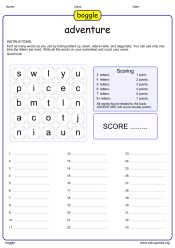
Codeword maker
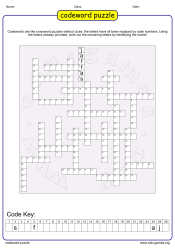
Communicative Crossword
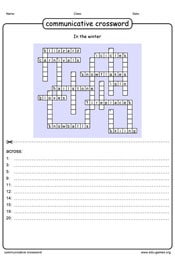
Compound word bingo
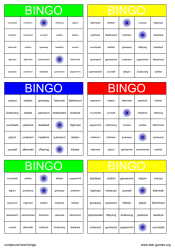
Compound word match maker
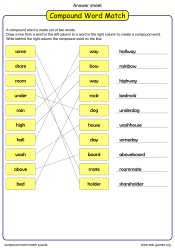
Crossword Maker

Daisy

Hidden Word Puzzle Maker
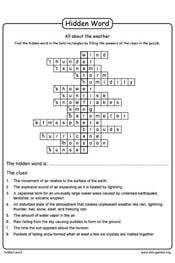
Reverse Word Search Maker

Word Bingo
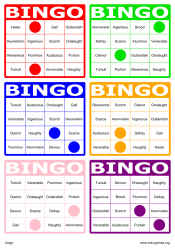
The bingo games are controlled practice activities to help students recognize, match and remember vocabulary items, and to improve listening skills.
Word Bingo Synonym

Word Chain
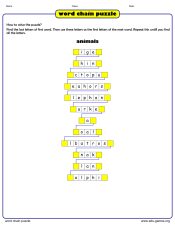
Word Fit
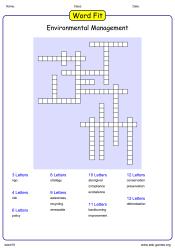
Word Ladder
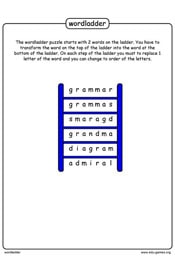
Word Ladder with clues

Word Pyramid
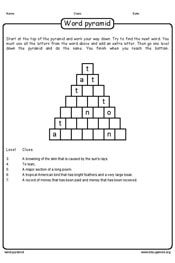
Word Scrabble

Word Scramble
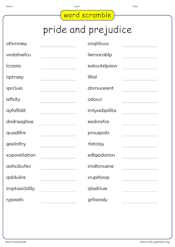
Word Scramble with Clues
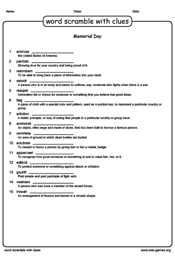
Word Search Maker
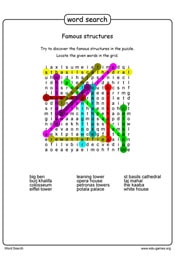
Word Search with Clues

Word Sudoku

Word Wheel
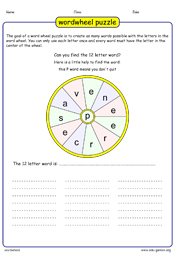
Word Zigzag

Terms of use of the edu games.
1. You can use the worksheets for free for non-commercial purposes, such as in schools, training centers or at home.
2. It is strictly forbidden to modify the worksheets in any way.
3. You can place an image of the worksheet on a website, but you have to place clearly and close to the image a link to www.edu-games.org.
4. It is forbidden to place the worksheet as a pdf file on a website.
5. You are allowed to use the worksheets (as pdf) in a closed environment for teaching purposes, as such Google’s Classroom. As long as the school or institution is free for the students and that they have free access to the worksheets.
6. There are no limitations on the numbers of worksheets you can create and download.
7. You give the edu games website the permission to use your created puzzles. Your puzzle will be checked and if it is suitable for other users it will be published on the website.
8. It is forbidden to embed www.edu-games.org into an i-frame of another website.







